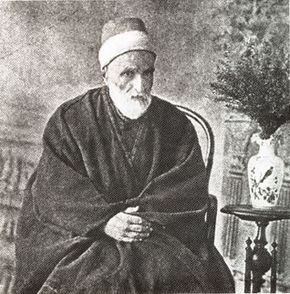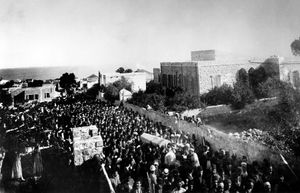Khadimullah

Mirza Agha Jan Kashani, in his youth, became a devoted follower of the Bab and a zealous servant of his cause. After his death, he continued the search for "He Who God Shall Make Manifest" and became the very first to believe in the mission of Bahá'u'lláh[1]. Agha Jan joined Baha'u'llah back in 1853 in Baghdad, moved with him to Istanbul, then to Adrianople [2] and thence to Acre. For forty years, until the death of Bahá'u'lláh, Aga Jan faithfully served him as his personal secretary, recording all his sayings and messages, and disseminating his teachings. The bulk of the Baha'i sacred books are written by his hand[2]. For his service, he received the titles of "Khadimullah" (servant of God), "servant who is always near" and "servant who is present before the Throne in honorary status", and is mentioned under them in hundreds of messages of Bahá'u'lláh[3]. In all of Baha'u'llah's circle of companions, there was no one who was as close to him as his companion, the attorney and master of ceremonies, who was the main channel of communication between Baha'u'llah and the believers[4]. Bahá'u'lláh foresaw that even after his death, Khadim would continue to have an important status in the Faith, second only to his sons. He wrote:
“O people! Hold fast after Me to the Branches [sons] that came from this preexisting root. Verily, through them the fragrances of My Garments will spread among the people of the world... Beware lest you follow every ignorant sinner. And after the Branches, prominence is assigned to the Servant who is present before the Throne. You should honor the family from which the Beloved of the world came ... And whoever turns away from them, verily, he is one of those who do not believe in God and become a polytheist. - Baha'u'llah . Tablet "O creator of all creation" (Lauh-i-badi) [5][6][7]
When dissension began to grow among the sons of Baha'u'llah, Mirza Agha Jan, as an experienced man who was thoroughly familiar with all the writings of Baha'u'llah, tried to intervene and achieve reconciliation between the parties. On the fifth anniversary of Bahá'u'lláh's death, Hadimullah called a meeting of the Bahá'ís and addressed them with a speech declaring that many of the sayings and actions of 'Abdu'l-Bahá were contrary to the instructions of Bahá'u'lláh as laid down in the scriptures [2]. Hearing about this speech, 'Abdu'l-Bahá with his 12 associates, fearing that the Agha Jan might declare himself the "Keeper of the Faith", broke into the premises, attacked Khadim and, after beating him and taking away all the texts (which included drafts of letters to famous believers), threatened with strangulation and locked in a barn. After this, 'Abdu'l-Bahá proclaimed Khadim "a scoundrel, an apostate, a liar, a hypocrite and a devil" [8]. The description of these events was later set forth by Hadimullah himself and published in a treatise entitled "The Terrible Incident of the Servant of Baha in the Blessed and Supreme Garden"[9]. After this incident, Khadimullah finally bowed to the side of Muhammad Ali, who and his brothers helped him to move under his protection to the building of the tomb of Baha'u'llahwhere he lived until his death on May 17, 1901[2]. After the death of Khadim Abdu'l-Bahá, having obtained permission from the nominal owner of the building of the tomb of Haji Sayyid Ali Afnan, the husband of Furugia Khanum, seized all of his heritage, in accordance with the desire of the deceased, left for storage in the tomb of Baha'u'llah: 12 sacred portraits, 217 tablets that were at his disposal Baha'u'llah, Baha'u'llah's clothes, other religious literature, as well as many of his own writings and personal correspondence.
Shortly before his death, Aga Jan sent a letter to a believer from Bombay, Haji Hussein Ali Jahrumi, who came to Acre to form an unbiased opinion on the current situation and conducted a series of interviews[2]. An excerpt from this message was published by Ibrahim Khairullah in 1901 in Facts for the Baha'is, and in its entirety as a 223-page treatise it was published in Cairo in April 1902. In it he systematized his accusations against 'Abdu'l-Bahá[2]:
- 'Abdu'l-Bahá persuaded his followers that it was their duty to curse his brothers, sisters and Bahá'u'lláh's widow Mahd-i-Ula and recognize all these relatives and their supporters as "apostates".
- Repeatedly, in order to inflict bodily harm, he physically attacked Mahd-i-Ulya and his half-sister Furugia Khanum, who, due to the suffering, fell ill with paralysis and was bedridden for 5 years; treated other relatives harshly, speaking with them in a rude language [2].
- He forbade followers to conduct any correspondence, discussion, conversations and even trade with those who do not recognize his claims, thus sowing enmity between relatives, which led to the destruction of many families.
- He did not allow to send a single letter outside Akko to anyone without his personal censorship and fastening it with his own seal.
- Banned the distribution and publication of the writings of Bahá'u'lláh, ordering his followers to read and distribute only his own writings [2].
- He issued a strict order to reject every sacred tablet of Baha'u'llah if it was not approved by him and sealed with his seal, rejected the contents of the "Sacred Tablet", written by Baha'u'llah's hand and dedicated to his son Muhammad Ali, and ordered the destruction of the tablets of Baha'u'llah written by the pen of his younger brothers.
- Concealed the last part of Bahá'u'lláh's will, which was never published in the original[2][10] [11][12], and misinterpreted part of its content.

Recognizing that 'Abdu'l-Bahá's supporters are in the majority among the believers [2], Muhammad Ali, his children and followers have repeatedly called for dialogue, including by proposing to hold a unification conference of the faith [2][13][14][15][16][17] to try to reconcile differences. The brother even attempted to personally visit 'Abdu'l-Bahá after the latter's return from America in early 1914. However, all their appeals were rejected or ignored [18] - the complete refusal of dialogue completely removed the current need for 'Abdu'l-Bahá to issue any detailed rebuttals of his brother's criticism [19]. Only in a will written between 1901 and 1908 and made public after his death in 1921 did 'Abdu'l-Bahá voluminously accuse Muhammad Ali of conspiracy and apostasy , declaring him and his supporters " Covenant Breakers " for refusing to obey him and accept his understanding of religion. [20]. Most of Bahá'u'lláh's family, including his two wives living at that time, Fatima and Gavhara, and their children, supported the side of Gusn-i-Akbar. 'Abdu'l-Bahá's side was preserved only by his own family and Bahiyyeh Khanum , his younger full-blooded sister [21]. In 1922 there were 158 Bahá'ís in Palestine [22]. Subsequently, 'Abdu'l-Bahá's successor Shoghi Effendi Rabbani [2] excommunicated everyone from the faith [2] of their relatives [2] , ordering them to leave the territory of Palestine [2], and depriving them of basic religious rights, including the right to visit the shrine of Bahá'u'lláh in Acre [2][23][24].
- ↑ "The First Person to Recognize Bahá'u'lláh as a Manifestation of God". Baha 'i Library. 1991-06-20. Archived from the original on 2020-06-06. Retrieved 2020-06-06.
- ↑ 2.00 2.01 2.02 2.03 2.04 2.05 2.06 2.07 2.08 2.09 2.10 2.11 2.12 2.13 2.14 2.15 [[#CITEREF|]].
- ↑ "Story: "...thousands of worlds of incomparable splendor were unveiled to my eyes…" – a spiritual experience by a youth". Huqúqu'lláh - God's 'special favour' to humanity. 2017-11-28. Archived from the original on 2020-06-06. Retrieved 2020-06-06.
- ↑ Taherzadeh 1992, pp. 181–186, Mirza Agha Jan.
- ↑ A Lost History… 2014, pp. 267–269, Shua Ullah Behai — Some Notable Baha'is.
- ↑ Jalal Azal 2004, pp. 184–186, 18.4. Baha's Swam Song on Ghiyath & Mustaghath.
- ↑ Emtesali, Naser (2013-03-25). "Baha'u'llah's senile ramblings: The tablet of O Creator of all creation". Bahaism. Archived from the original on 2020-07-07. Retrieved 2020-07-07.
- ↑ Browne 1918, p. 88, An Epitome of Babi and Baha'i history to A.D. 189.
- ↑ Template:Book Template:Wayback
- ↑ Warburg, Margit 2006, pp. 181, Abdu'l Baha and the Covenant.
- ↑ Template:Article
- ↑ A Lost History… 2014, pp. 207–209, Mohammad Ali Bahai - Autobiography of Mohammed Ali Bahai.
- ↑ "An open letter to Sir Abbas Effendi". Baha'i 'Faith'. 2013-02-07. Archived from the original on 2019-06-04. Retrieved 2019-06-04.
- ↑ A Lost History… 2014, p. 227, Mohammad Ali Bahai — Autobiography of Mohammed Ali Bahai.
- ↑ A Lost History… 2014, p. 182, Shua Ullah Bahai — An Interview with Ghusn-i-Akbar.
- ↑ Browne 1918, p. 82, An Epitome of Babi and Baha'i history to A.D. 189.
- ↑ A Lost History… 2014, p. 487, Shua Ullah Bahai — A Reminiscence: The Purpose, Condition and Potential of the Baha'i Faith.
- ↑ "Mohammad Ali Effendi's Effort to save the Faith". Unitarian Bahai's. 2013-11-14. Archived from the original on 2019-05-29. Retrieved 2019-05-29.
- ↑ Cole, Juan R.I. 2005, p. 332.
- ↑ Momen, Moojan (1995). "Covenant, The, and Covenant-breaker". Baha'i Library. Archived from the original on 2021-05-13. Retrieved 2019-06-10.
- ↑ Miller 1974, p. 178, The Rule of Abdu'l-Baha.
- ↑ Template:Book
- ↑ Kamar 1953, Statements on the Dispute Between the Baha'i Family.
- ↑ Jalal Azal 2004, pp. 330–331, 9.25 Restricting of Access to Baha's Shrine.
